It's a testament to the fact that we're so used to seeing Spain's top clubs steamrolling the rest of the league that Real Madrid's 1-1 draw at Athletic Bilbao is seen as two points dropped. In the grand scheme of things, it probably is: Barcelona fell at home 24 hours earlier. This was the chance to pull level, three points behind Atletico Madrid, who had knocked off Real Sociedad earlier on Sunday.
But as Carlo Ancelotti's crew discovered, Athletic Bilbao at the San Mames are actually a tough proposition. Just ask Barcelona, who lost there in December. Thirty of a possible thirty-six points in La Liga this season tell their own story.
Without Gareth Bale, Ancelotti opted for the youngster Jese instead of trying to shoehorn Isco into the lineup. In the first half Madrid were stale, rattled by Bilbao's intensity and intermittent pressing. In the second half, they came to life and took the lead when Cristiano Ronaldo set up the livewire Jese.
- Corrigan: Three Things
- Rigg: No shame in Bilbao draw
Then the 90-second spell that changed the game. Super-sub Ibai Gomez -- six league goals off the bench for him this season, more than anyone in Europe's big five -- uncorked a sidewinder missile of the shot that gave Diego Lopez no chance. Almost immediately afterward, Ronaldo was sent off.
He first appeared to appeal for a handball and then came face to face with veteran Carlos Gurpegui. Words were exchanged, Gurpegui shoved Ronaldo lightly. The Ballon d'Or winner's hand came up, seemingly as if he was going to scratch his opponent. There may or may not have been contact, but either way, Gurpegui collapsed to the pitch, igniting a melee which saw Ronaldo again go toe to toe with Ander Iturraspe.
Most expected a yellow card and a stern talking-to. Instead, Ronaldo was sent off and Iturraspe got a yellow. Harsh? Probably, in the sense that many referees might have handled it differently. But, equally, you raise your hand to an opponent's face and you're always at risk of a red.
But as Carlo Ancelotti's crew discovered, Athletic Bilbao at the San Mames are actually a tough proposition. Just ask Barcelona, who lost there in December. Thirty of a possible thirty-six points in La Liga this season tell their own story.
Without Gareth Bale, Ancelotti opted for the youngster Jese instead of trying to shoehorn Isco into the lineup. In the first half Madrid were stale, rattled by Bilbao's intensity and intermittent pressing. In the second half, they came to life and took the lead when Cristiano Ronaldo set up the livewire Jese.
- Corrigan: Three Things
- Rigg: No shame in Bilbao draw
Then the 90-second spell that changed the game. Super-sub Ibai Gomez -- six league goals off the bench for him this season, more than anyone in Europe's big five -- uncorked a sidewinder missile of the shot that gave Diego Lopez no chance. Almost immediately afterward, Ronaldo was sent off.
He first appeared to appeal for a handball and then came face to face with veteran Carlos Gurpegui. Words were exchanged, Gurpegui shoved Ronaldo lightly. The Ballon d'Or winner's hand came up, seemingly as if he was going to scratch his opponent. There may or may not have been contact, but either way, Gurpegui collapsed to the pitch, igniting a melee which saw Ronaldo again go toe to toe with Ander Iturraspe.
Most expected a yellow card and a stern talking-to. Instead, Ronaldo was sent off and Iturraspe got a yellow. Harsh? Probably, in the sense that many referees might have handled it differently. But, equally, you raise your hand to an opponent's face and you're always at risk of a red.
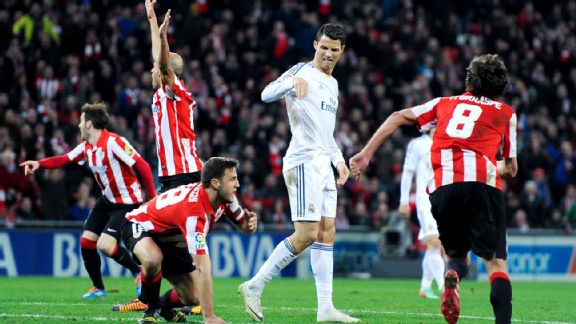 David Ramos/Getty ImagesCristiano Ronaldo should have known better. So, too, should Real.
David Ramos/Getty ImagesCristiano Ronaldo should have known better. So, too, should Real.In other words, it was foolish for Ronaldo to put himself in that situation. Call it a lapse. His critics will call him a posturing diva, but in fact, this only his second red since 2010 -- the other, of course, was in last year's Copa del Rey final. Down to 10 men, Ancelotti played the percentages: Jese off, Asier Illaramendi on. He knew all too well that he could live with a draw, but a defeat could complicate things.
And so Madrid live to fight another day. Their unbeaten streak is up to 21 in all competitions. And yet there are concerns that go beyond Ronaldo's inevitable ban and Bale's injury. AsMarca points out, in seven games against top opposition -- the rest of the top five and Juventus in the Champions League -- Madrid have won just twice, against Athletic Bilbao and, controversially, against Juventus, both at home. The other five? Two defeats and three draws. No question that they need to kick it up a notch against the big boys.
More misery for Moyes: It was another rough weekend for David Moyes. Manchester United's 2-1 defeat at Stoke was their eighth of the season in the Premier League. In 2014, in all competitions, they've lost five of eight games.
After the game he said he thought his team had played "very well," earning him derision in some quarters. And rightly so. Because United did not play "very well." And if that's his idea of playing "very well," then we've got problems.
- Mitten: Season on the brink
- Okwonga: Moyes must attack
- Highlights: Stoke 2-1 Man Utd (U.S. only)
- FC TV: Can Man Utd finish top four?
Moyes, you would think, had his own reasons for saying what he said. Maybe he wanted to keep spirits high. Maybe he wanted to send a message to the fans, even though it's hard to buy into the fact that this is what he wants from his team.
That said, if he had simply come out and stated that United were unlucky, he would have been right. That's what you are when you lose one centre-back after 11 minutes (Jonny Evans) and another by half-time (Phil Jones) and when you're beaten by one deflected shot and a once-in-a-blue-moon wonder-strike.
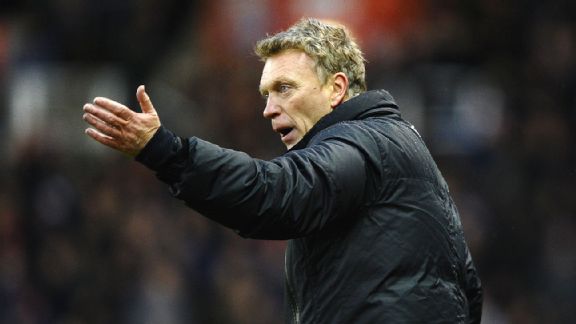 Laurence Griffiths/Getty ImagesDavid Moyes had better be lying when he says he thought United played well in Saturday's defeat at Stoke.
Laurence Griffiths/Getty ImagesDavid Moyes had better be lying when he says he thought United played well in Saturday's defeat at Stoke.United could easily have taken a point from this game, maybe all three. If you only see games as a series of incidents and figure out which ones went your way and which ones did not, you can conclude that they did enough to win and it's simply misfortune.
But that's not how you read a game. And I'm fairly sure that's not how Moyes reads it, either. I suspect what he told the media after the game and what he said to his assistants in his post-mortem were rather different. At least, I hope so.
An imperfect win: Juventus' 3-1 win over Inter was about as one-sided as they come for about 70-odd minutes. Walter Mazzarri's men looked lost and rattled by Juve's intensity. Indeed, speaking after the game Mazzarri said that it's a question of individual battles, particularly in midfield. Juve won those and Inter lost them. And it's in part because the home team played extremely well (particularly Kwadwo Asamoah and Stephane Lichsteiner) and in part because there is a qualitative abyss between these two teams right now.
(Go on, if you don't believe me, count the number of Inter players would get into Juve's line-up? Bet you don't use more than one finger, if any.)
And yet you suspect Antonio Conte wasn’t too happy at the final whistle, either. Despite their struggles, Inter wasted at least three clear-cut chances in the final minutes. Juventus appeared to switch off as Rodrigo Palacio -- shackled for much of the game -- suddenly found himself in space and with opportunities to shoot.
You get away with those late-game wobbles against poor teams or average teams playing badly, like Inter. You don't at the next level, which incidentally is part of the reason why Juve are in the Europa League and not the big competition.
The most frustrating is that we're talking about mental errors here, precisely the kind of mistakes Conte hates. You get the feeling this will be a tough week in training at Vinovo this week.
Big problems for Barca? Speaking of defensive meltdowns, Gerardo "Tata" Martino needs to figure out if what we saw against Valencia was a blip or if it's something he needs to work on. Sure, if Lionel Messi -- who said afterwards that he was fine and simply "had a bad day" -- had been at his usual stratospheric level, they might have scored four goals and taken all three points.
- Ledwith: Slack defending costs Barca
- FC TV: What's wrong with Messi?
But it wouldn't have changed the fact that they gave up three goals at home against a team so cash-strapped that they have spent the past year selling (or giving away, to save on wages) just about anybody who wasn't nailed down to the Mestalla.
Roberto Soldado, Nelson Valdez, Sergio Canales, Facundo Costa, Adil Rami, Ever Banega, Aly Cissokho, Andres Guardado and Helder Postiga -- all of whom contributed to varying degrees either this season or last -- have left and been replaced by younger, cheaper versions. Guys like Juan Bernat, who is 20 and had started just 8 Liga games before the current campaign. Or Paco Alcacer, also 20, who scored the winner and who was making his just 12th start in the top flight.
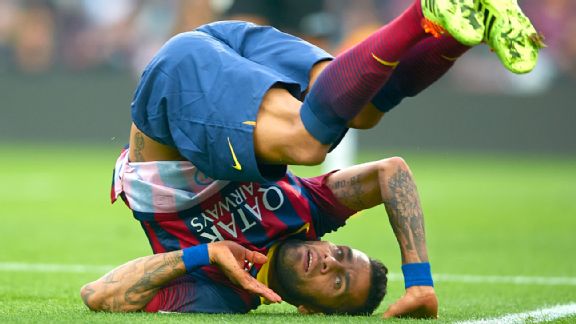 Manuel Queimadelos Alonso/Getty ImagesBarca's defeat at Valencia was troubling but was it only a blip?
Manuel Queimadelos Alonso/Getty ImagesBarca's defeat at Valencia was troubling but was it only a blip?You can pinpoint basic defensive blunders on each of Valencia's three goals, including the one scored by Pablo Piatti, all 5-foot-4 of him, who headed the ball past Valdes. (The fact that he also scored a headed goal against Real Madrid earlier this season is scant consolation.)
We know Dani Alves and Jordi Alba are wing-backs, if not outright wingers. We know Javier Mascherano is a recycled midfielder and that Gerard Pique has his off-days. But this was true in the Pep Guardiola era as well, and part of Martino's schtick was that he was going to fix it. And if, to some degree, you could get away with it in the days of Pep-Tito uber-tiki-taka, uber-possession days, you need to be better defensively if you're going to play Martino's more direct style.
Martino was also taken to task for chasing the game by removing Xavi -- with 25 minutes to go -- and then Cesc Fabregas. That, perhaps, is less of an issue. But given Xavi's status in the dressing room and Cesc’s annoyance at coming off a few weeks ago, you wonder if it was the wisest thing to do.
Tough week for Liverpool: The Reds looked lackluster in the 1-1 away draw to West Bromwich Albion (compliments of an errant Kolo Toure pass) and on Deadline Day, they failed to aquire Yevhen Konoplyanka, FC Dnipro's attacking midfielder. Different versions circulate as to what actually happened out in Ukraine, where Ayre spent several days.
- Kelly: Transfer tensions rising
- Usher: Reds fail to take advantage
- Highlights: WBA 1-1 Liverpool (U.S. only)
- FC TV: Toure's costly error
- FC Extra Time: LFC's transfer failure
The story told in Liverpool is that the club reached a deal with Konoplyanka and agreed to meet his release clause of around $25 million but the club simply refused to process the paperwork. Elsewhere, they insist that what actually happened was that Dnipro jacked up the price at the last minute, figuring they could squeeze a few more million out of Ayre given all the time and effort he had put in.
We may never know the truth but if the release clause story is true, it's a case of caveat emptor. Except for Spain -- where the release clause mechanism works in such a way that it's the player buying out his contract and if he hands over enough money, he immediately becomes a free agent -- most release clauses are grey areas. You're basically counting on the selling club keeping their word.
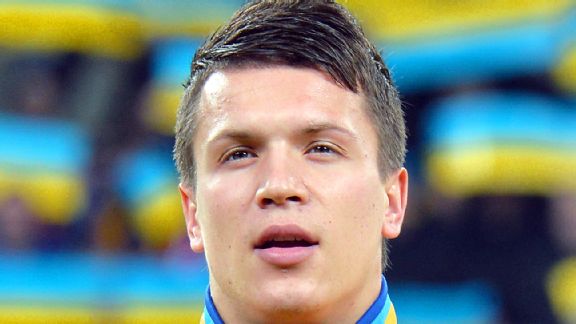 Sergei Supinsky/Getty ImagesGiven the confusion surrounding Liverpool's failed deal for Yehven Konoplyanka, perhaps it's best that the deal fell through.
Sergei Supinsky/Getty ImagesGiven the confusion surrounding Liverpool's failed deal for Yehven Konoplyanka, perhaps it's best that the deal fell through.If they choose to ignore it, your only option is for the player to take legal action which, in this case, would have been via the Ukrainian courts and against the third wealthiest man in the country. At the very least, it would have meant months of litigation with Konoplyanka sidelined pending the outcome.
You can see why Liverpool were wise not to go down that route.
In memoriam: Luis Aragones, the man who swept away the biggest psychological block in modern football history in guiding Spain to the 2008 European Championships, passed away Saturday morning in Madrid at age 75. That victory in Vienna paved the way for the World Cup two years later and another European championship in 2012. Before La Roja did it, no country had ever won three consecutive major titles.
Barca midfielder Xavi penned a heartfelt, emotional farewell in the Spanish newspaper El Pais.
"Luis was key to my career and to the history of La Roja," he wrote. "Without him, nothing would have been the same. It would have been impossible. Everything began with him."
Aragones' contribution to Spanish football was threefold. First, in a nation shattered by fierce club rivalries that often lapsed into politics (Catalunya versus Castilla versus the Basque Country) he created an environment marked by unity. One where players could still love their club and their region but also give their all to the national team. (Xavi himself, along with Real Madrid skipper Iker Casillas, was crucial to this as well.)
Next, at a time when the game was becoming faster and more physical, he had the courage to put skill and technique ahead of athleticism. Today, we take it for granted that technical ability comes first but eight years ago in the pre-Messi era, it wasn't quite so clear-cut. "He brought in the little guys... [Andres] Iniesta, [Santi] Cazorla, Cesc [Fabregas], [David] Silva, [David] Villa," writes Xavi.
- Alvarez: Farewell, Aragones
Finally, he got the burden off Spain's back, that hoo-doo whereby they had nothing to show at national-team level despite four decades of producing some of the continent's best players and a club game that included Barcelona and Real Madrid. Xavi himself remembers how Aragones made him feel important at a time when his self-esteem was close to zero.
Despite 31 years as a club manager including spells at Valencia, Sevilla and Barcelona and four separate stints at the helm of Atletico, you won't find a massive trophy haul: one Liga title and four Spanish Cups. But "El savio de Hortaleza" -- the Sage of Hortaleza -- saved his biggest coaching contribution for the end of his career.
Bayern back on form: So did the laboured midweek win away to Stuttgart -- it took a ridiculous overhead kick from Thiago Alcantara to secure the three points -- foreshadow some kind of wobble from Bayern Munich?
Yeah, right.
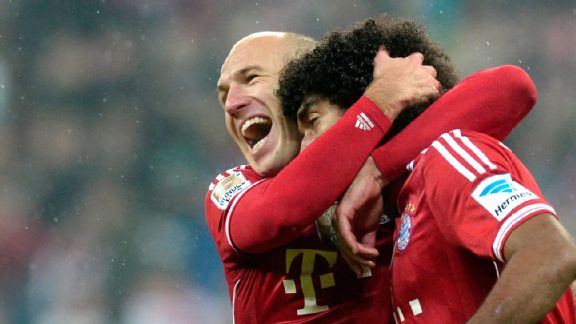 Christof Stache/Getty ImagesBayern kept rolling with a romp vs. lowly Frankfurt, proving that their Stuttgart draw was nothing to worry about.
Christof Stache/Getty ImagesBayern kept rolling with a romp vs. lowly Frankfurt, proving that their Stuttgart draw was nothing to worry about.Bayern rolled to a 5-0 win -- with five different goalscorers -- over Eintracht Frankfurt. Arjen Robben, Bastian Schweinsteiger, Javi Martinez, Toni Kroos and Thomas Mueller were all missing from the starting lineup and it was no problem at all. In fact, Pep Guardiola seemed to enjoy donning his lab coat and performing all sorts of experiments: giving Xherdan Shaqiri a game, moving Mario Goetze behind the striker and giving Thiago full control of the team. Which he did, amassing a total of 185 touches. This apparently set a Bundesliga record.
- Schaaf: Bayern back to their best
Now, obviously, they haven't been keeping track of this sort of thing for that long, but think about it: 185 touches is two every minute. It's Xavi-esque. Which, I guess, was Pep’s objective all along.
Another rising star in Serie A: Following a whirlwind 82 minutes in Lazio's two-nil win at Chievo that saw him score a goal, set up another and come close with a gorgeous back-heel, Keita Balde is flavor of the week in Rome. And he's one heck of a story. The 18-year-old was born and raised in Spain to Senegalese parents and entered Barcelona's famed La Masia at age 9.
When he was 15, Barcelona went on tour to Qatar and, as the tale goes, he played a prank on a teammate by dumping an ice bucket in his bed. Barca weren't pleased and loaned him out, supposedly as punishment. Keita did not take it well and as soon as he turned 16, he left the club to join Lazio.
Under Vladimir Petkovic he didn't see much playing time, but new boss Eduardo Reja appears to have more faith in the youngster. If he continues at this pace, the Spanish FA may well wonder why they bothered to naturalize Diego Costa.
Cabaye slots seamlessly in at PSG:
Paris St. Germain's $31 million acquisition of Yohan Cabaye raised a few eyebrows. Not so much in terms of quality, but because it's a lot of money to pay for a 28-year-old who had already shown a willingness to engineer a move elsewhere.
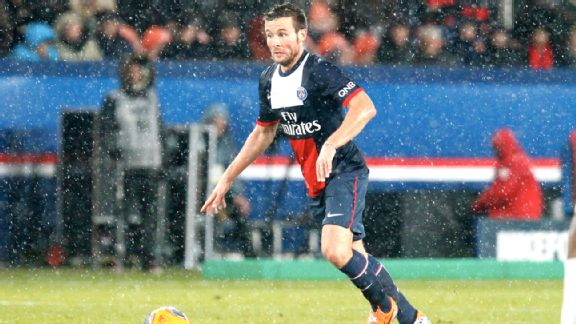 Xavier Laine/Getty ImagesYohan Cabaye has given PSG midfield balance -- and also negotiation leverage with some of Laurent Blanc's squad.
Xavier Laine/Getty ImagesYohan Cabaye has given PSG midfield balance -- and also negotiation leverage with some of Laurent Blanc's squad.But think of it as insurance. For all their riches PSG are somewhat undermanned in the middle of the park, especially if Laurent Blanc sticks to his favored 4-3-3, which seems to be the best way to get Edinson Cavani and Zlatan Ibrahimovic on the pitch at the same time. Blaise Matuidi becomes a free agent in June and while he says he'll sign a new deal, he's been saying it for months and it hasn't happened yet.
- Johnson: Cavani's injury impact
- Blog: Moura leads PSG to win
- Cabaye: Blanc finally gets his man
Cabaye's arrival gives the club a little more leverage in that department. Thiago Motta has been largely healthy this year, but his injury record is well-documented. Javier Pastore is frighteningly inconsistent and -- probably -- not suited to the role. Marco Verratti and Adrien Rabiot are superstars in the making, but the former has a penchant for getting himself suspended while the latter is still just 18 years old.
This deal offers Blanc quality, yes, but also a bit more breathing space should misfortune strike in the form of injuries, suspensions or contractual disputes.

0 comments:
Post a Comment